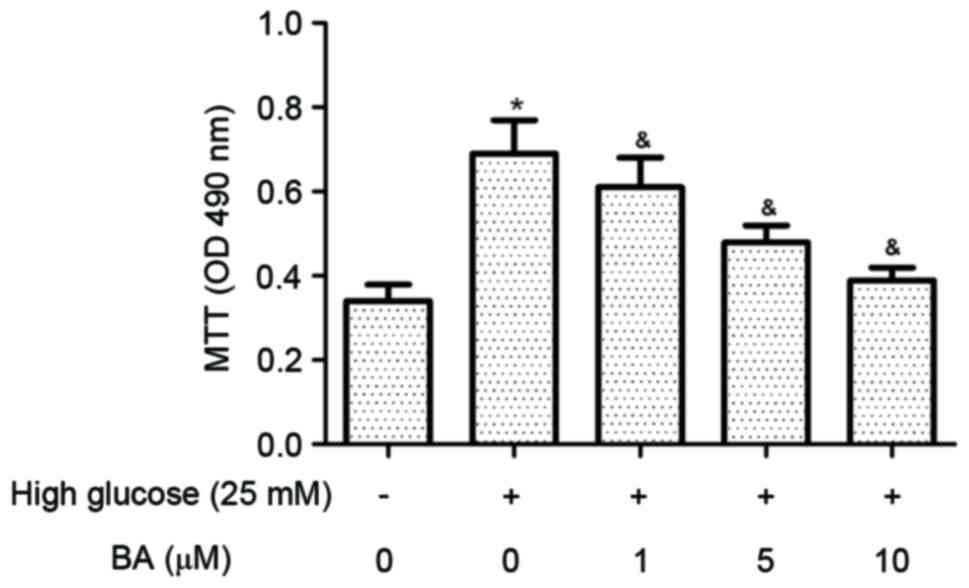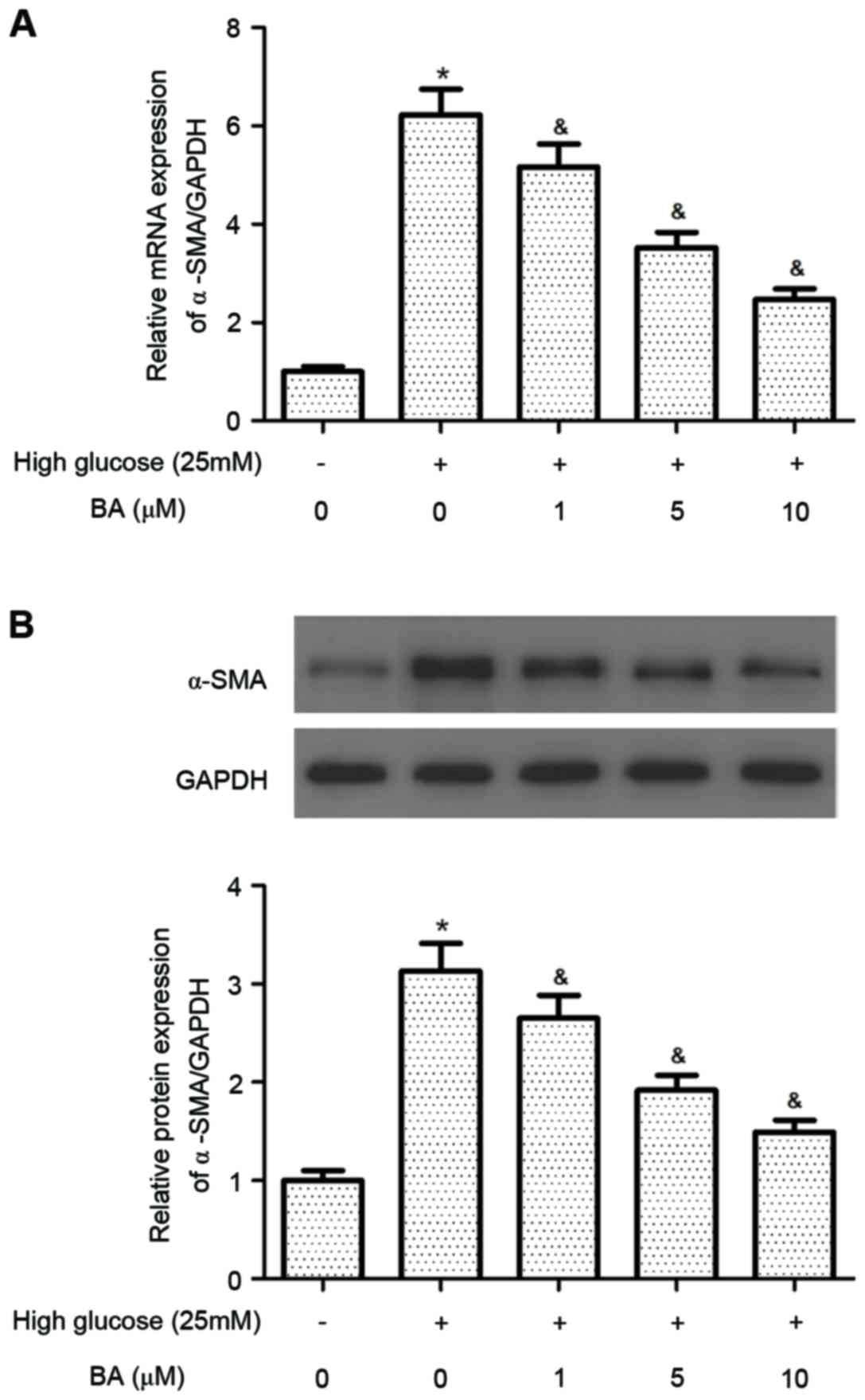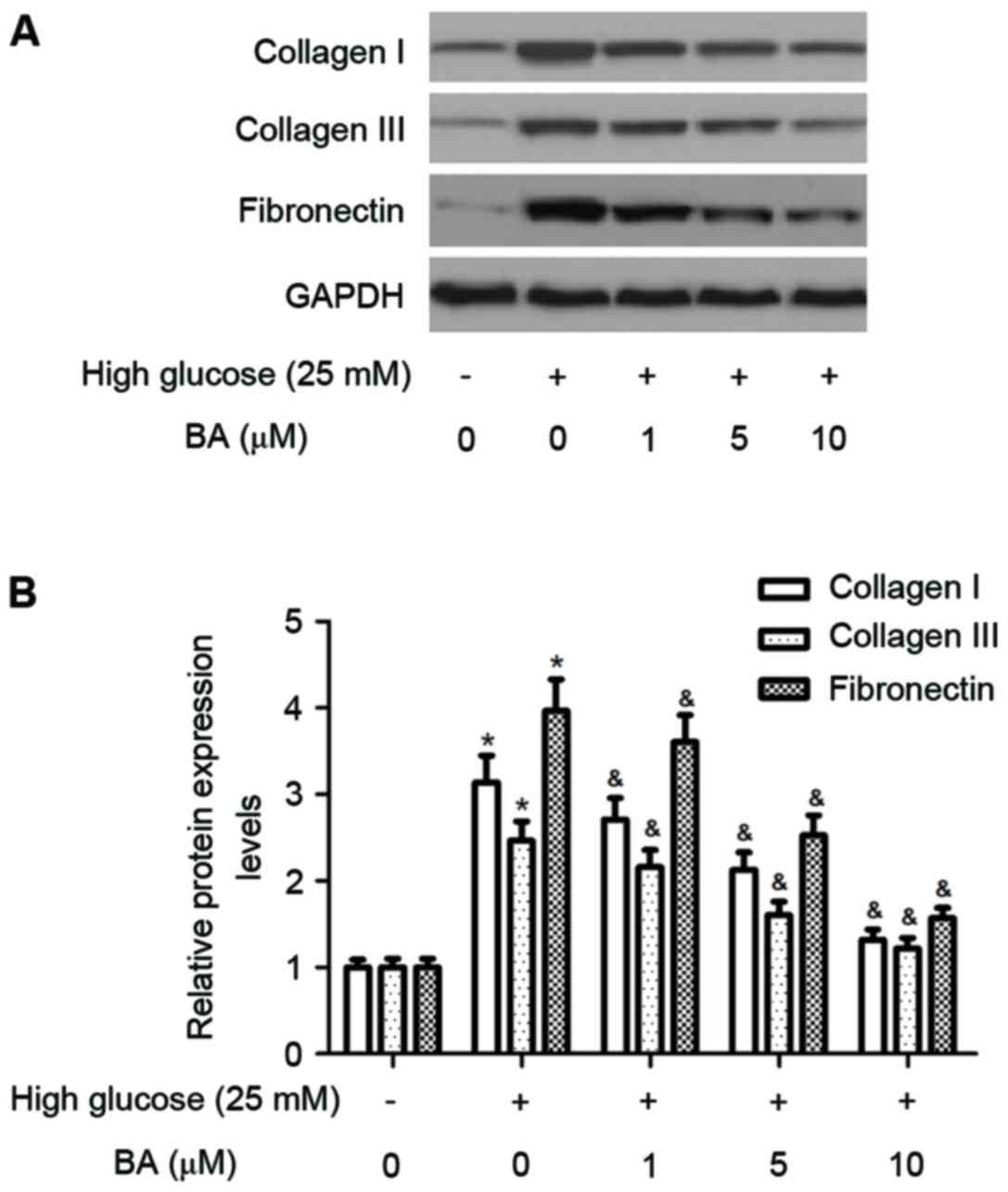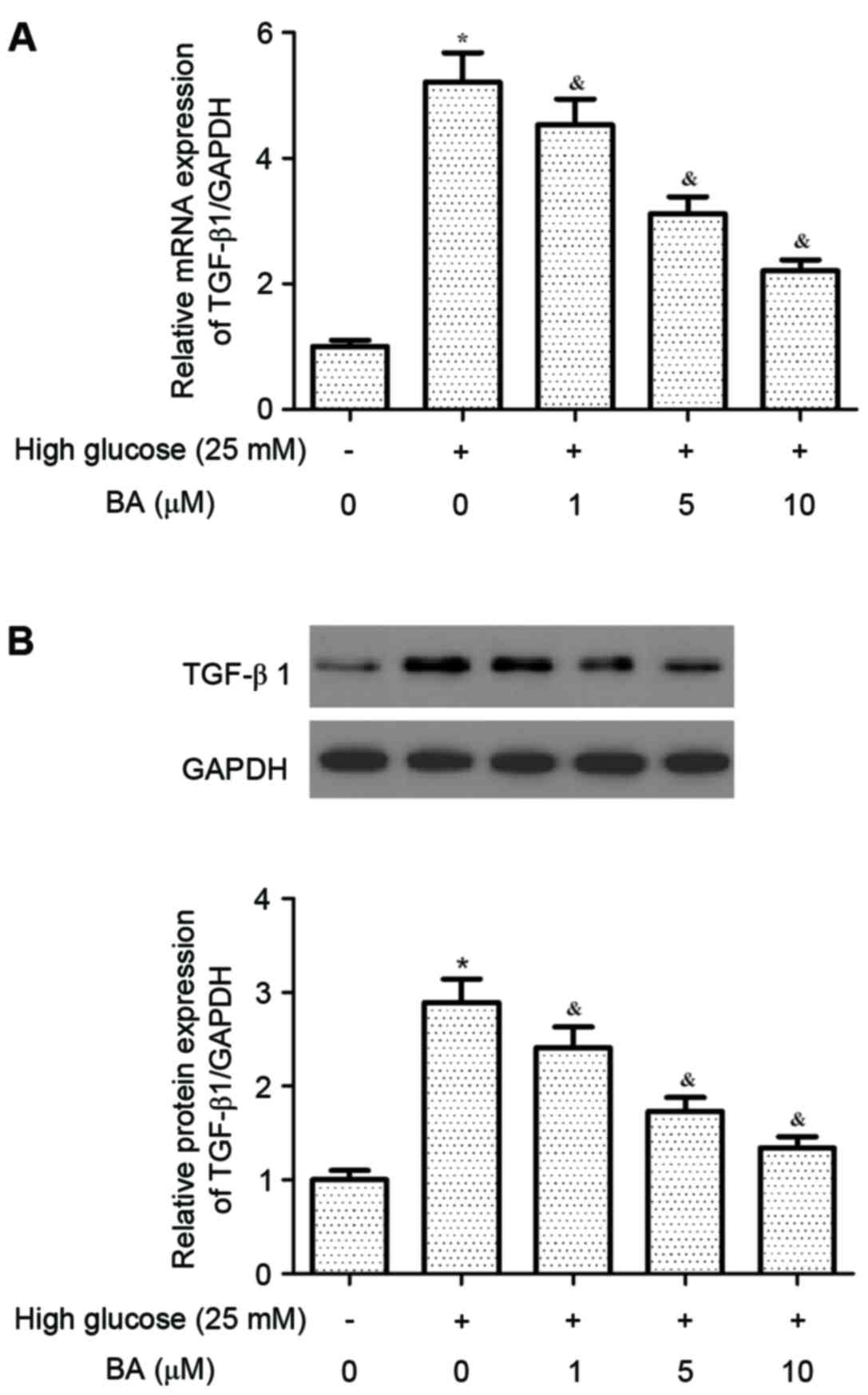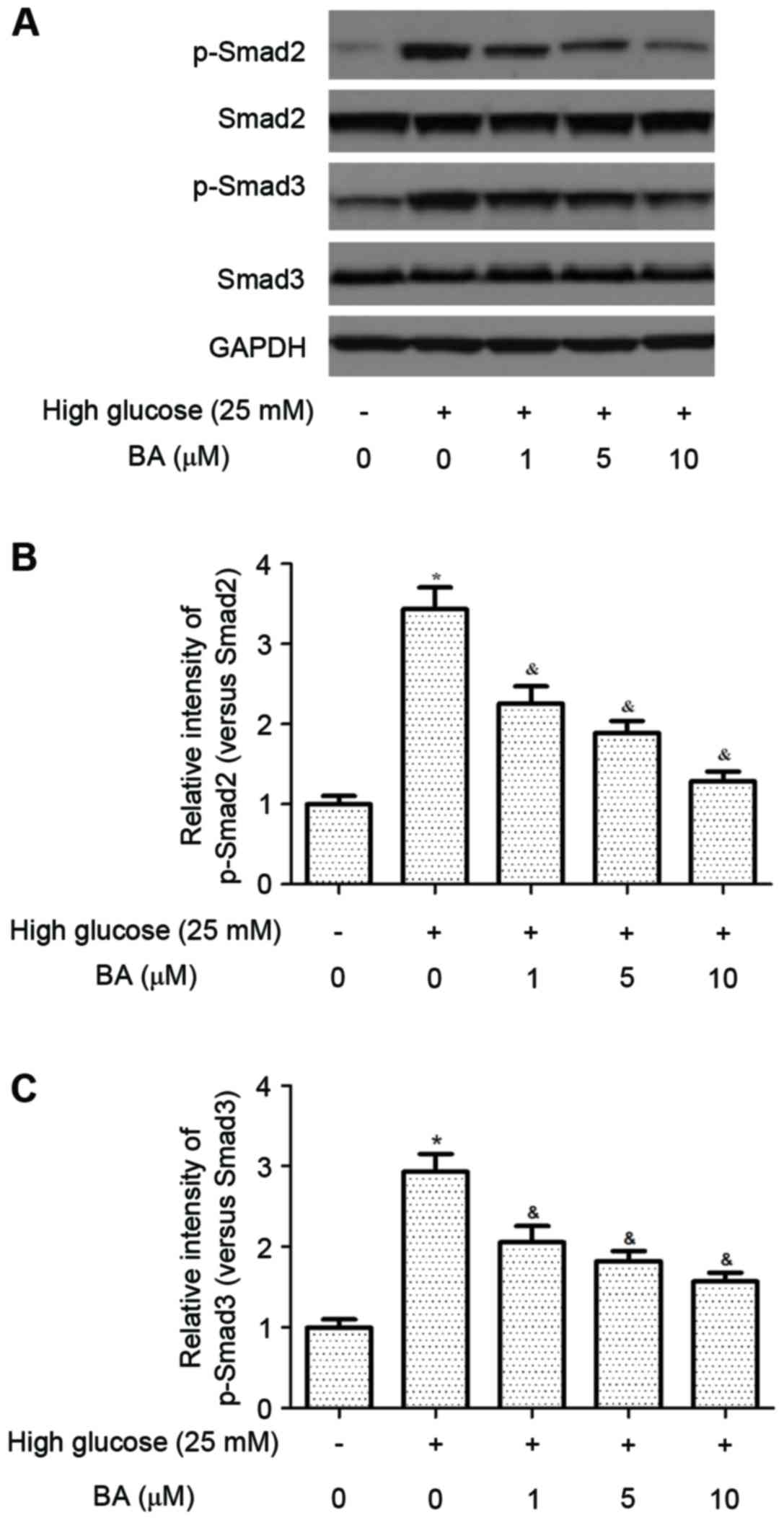|
1
|
Kong P, Christia P and Frangogiannis NG:
The pathogenesis of cardiac fibrosis. Cell Mol Life Sci.
71:549–574. 2014. View Article : Google Scholar : PubMed/NCBI
|
|
2
|
Krenning G, Zeisberg EM and Kalluri R: The
origin of fibroblasts and mechanism of cardiac fibrosis. J Cell
Physiol. 225:631–637. 2010. View Article : Google Scholar : PubMed/NCBI
|
|
3
|
Teunissen BE, Smeets PJ, Willemsen PH, De
Windt LJ, Van der Vusse GJ and Van Bilsen M: Activation of
PPARdelta inhibits cardiac fibroblast proliferation and the
transdifferentiation into myofibroblasts. Cardiovasc Res.
75:519–529. 2007. View Article : Google Scholar : PubMed/NCBI
|
|
4
|
Fan D, Takawale A, Lee J and Kassiri Z:
Cardiac fibroblasts, fibrosis and extracellular matrix remodeling
in heart disease. Fibrogenesis Tissue Repair. 5:152012. View Article : Google Scholar : PubMed/NCBI
|
|
5
|
Tian K, Liu Z, Wang J, Xu S, You T and Liu
P: Sirtuin-6 inhibits cardiac fibroblasts differentiation into
myofibroblasts via inactivation of nuclear factor κB signaling.
Transl Res. 165:374–386. 2015. View Article : Google Scholar : PubMed/NCBI
|
|
6
|
Bugyei-Twum A, Advani A, Advani SL, Zhang
Y, Thai K, Kelly DJ and Connelly KA: High glucose induces Smad
activation via the transcriptional coregulator p300 and contributes
to cardiac fibrosis and hypertrophy. Cardiovasc Diabetol.
13:892014. View Article : Google Scholar : PubMed/NCBI
|
|
7
|
Tang M, Zhang W, Lin H, Jiang H, Dai H and
Zhang Y: High glucose promotes the production of collagen types I
and III by cardiac fibroblasts through a pathway dependent on
extracellular-signal-regulated kinase 1/2. Mol Cell Biochem.
301:109–114. 2007. View Article : Google Scholar : PubMed/NCBI
|
|
8
|
Kasperczyk H, La Ferla-Brühl K, Westhoff
MA, Behrend L, Zwacka RM, Debatin KM and Fulda S: Betulinic acid as
new activator of NF-κB: Molecular mechanisms and implications for
cancer therapy. Oncogene. 24:6945–6956. 2005. View Article : Google Scholar : PubMed/NCBI
|
|
9
|
Yogeeswari P and Sriram D: Betulinic acid
and its derivatives: A review on their biological properties. Curr
Med Chem. 12:657–666. 2005. View Article : Google Scholar : PubMed/NCBI
|
|
10
|
Pavlova N, Savinova O, Nikolaeva S, Boreko
E and Flekhter O: Antiviral activity of betulin, betulinic and
betulonic acids against some enveloped and non-enveloped viruses.
Fitoterapia. 74:489–492. 2003. View Article : Google Scholar : PubMed/NCBI
|
|
11
|
Xia A, Xue Z, Li Y, Wang W, Xia J, Wei T,
Cao J and Zhou W: Cardioprotective effect of betulinic acid on
myocardial ischemia reperfusion injury in rats. Evid Based
Complement Alternat Med. 2014:5737452014. View Article : Google Scholar : PubMed/NCBI
|
|
12
|
Wan Y, Wu YL, Lian LH, Xie WX, Li X,
Ouyang BQ, Bai T, Li Q, Yang N and Nan JX: The anti-fibrotic effect
of betulinic acid is mediated through the inhibition of NF-κB
nuclear protein translocation. Chem-Biol Interact. 195:215–223.
2012. View Article : Google Scholar : PubMed/NCBI
|
|
13
|
Turner NA, Das A, Warburton P, O'Regan DJ,
Ball SG and Porter KE: Interleukin-1alpha stimulates
proinflammatory cytokine expression in human cardiac
myofibroblasts. Am J Physiol Heart Circ Physiol. 297:H1117–H1127.
2009. View Article : Google Scholar : PubMed/NCBI
|
|
14
|
Livak KJ and Schmittgen TD: Analysis of
relative gene expression data using real-time quantitative PCR and
the 2(-Delta Delta C(T)) method. Methods. 25:402–408. 2001.
View Article : Google Scholar : PubMed/NCBI
|
|
15
|
Chen HN, Wang DJ, Ren MY, Wang QL and Sui
SJ: TWEAK/Fn14 promotes the proliferation and collagen synthesis of
rat cardiac fibroblasts via the NF-кB pathway. Mol Biol Rep.
39:8231–8241. 2012. View Article : Google Scholar : PubMed/NCBI
|
|
16
|
Driesen RB, Nagaraju CK, Abi-Char J,
Coenen T, Lijnen PJ, Fagard RH, Sipido KR and Petrov VV: Reversible
and irreversible differentiation of cardiac fibroblasts. Cardiovasc
Res. 101:411–422. 2013. View Article : Google Scholar : PubMed/NCBI
|
|
17
|
Wang P, Li H, Wang Y, Chen H and Zhang P:
Effects of recombinant human relaxin upon proliferation of cardiac
fibroblast and synthesis of collagen under high glucose condition.
J Endocrinol Invest. 32:242–247. 2009. View Article : Google Scholar : PubMed/NCBI
|
|
18
|
Neumann S, Huse K, Semrau R, Diegeler A,
Gebhardt R, Buniatian GH and Scholz GH: Aldosterone and D-glucose
stimulate the proliferation of human cardiac myofibroblasts in
vitro. Hypertension. 39:756–760. 2002. View Article : Google Scholar : PubMed/NCBI
|
|
19
|
Zhou H, Zhang KX, Li YJ, Guo BY and Wang M
and Wang M: Fasudil hydrochloride hydrate, a Rho-kinase inhibitor,
suppresses high glucose-induced proliferation and collagen
synthesis in rat cardiac fibroblasts. Clin Exp Pharmacol Physiol.
38:387–394. 2011. View Article : Google Scholar : PubMed/NCBI
|
|
20
|
Porter KE and Turner NA: Cardiac
fibroblasts: At the heart of myocardial remodeling. Pharmacol Ther.
123:255–278. 2009. View Article : Google Scholar : PubMed/NCBI
|
|
21
|
Fedak PW, Bai L, Turnbull J, Ngu J, Narine
K and Duff HJ: Cell therapy limits myofibroblast differentiation
and structural cardiac remodeling basic fibroblast growth
factor-mediated paracrine mechanism. Circ Heart Fail. 5:349–356.
2012. View Article : Google Scholar : PubMed/NCBI
|
|
22
|
Wang X, Gao G, Liu J, Guo R, Lin Y, Chu Y,
Han F, Zhang W and Bai Y: Identification of differentially
expressed genes induced by angiotensin II in rat cardiac
fibroblasts. Clin Exp Pharmacol Physiol. 33:41–46. 2006. View Article : Google Scholar : PubMed/NCBI
|
|
23
|
Lim H and Zhu Y: Role of transforming
growth factor-beta in the progression of heart failure. Cell Mol
Life Sci. 63:2584–2596. 2006. View Article : Google Scholar : PubMed/NCBI
|
|
24
|
Bujak M and Frangogiannis NG: The role of
TGF-beta signaling in myocardial infarction and cardiac remodeling.
Cardiovasc Res. 74:184–195. 2007. View Article : Google Scholar : PubMed/NCBI
|
|
25
|
Kuwahara F, Kai H, Tokuda K, Kai M,
Takeshita A, Egashira K and Imaizumi T: Transforming growth
factor-beta function blocking prevents myocardial fibrosis and
diastolic dysfunction in pressure-overloaded rats. Circulation.
106:130–135. 2002. View Article : Google Scholar : PubMed/NCBI
|
|
26
|
Singh VP, Baker KM and Kumar R: Activation
of the intracellular renin-angiotensin system in cardiac
fibroblasts by high glucose: Role in extracellular matrix
production. Am J Physiol Heart Circ Physiol. 294:H1675–H1684. 2008.
View Article : Google Scholar : PubMed/NCBI
|
|
27
|
Liu J, Zhuo X, Liu W, Wan Z, Liang X, Gao
S, Yuan Z and Wu Y: Resveratrol inhibits high glucose induced
collagen upregulation in cardiac fibroblasts through regulating
TGF-β1-Smad3 signaling pathway. Chem Biol Interact. 227:45–52.
2015. View Article : Google Scholar : PubMed/NCBI
|















